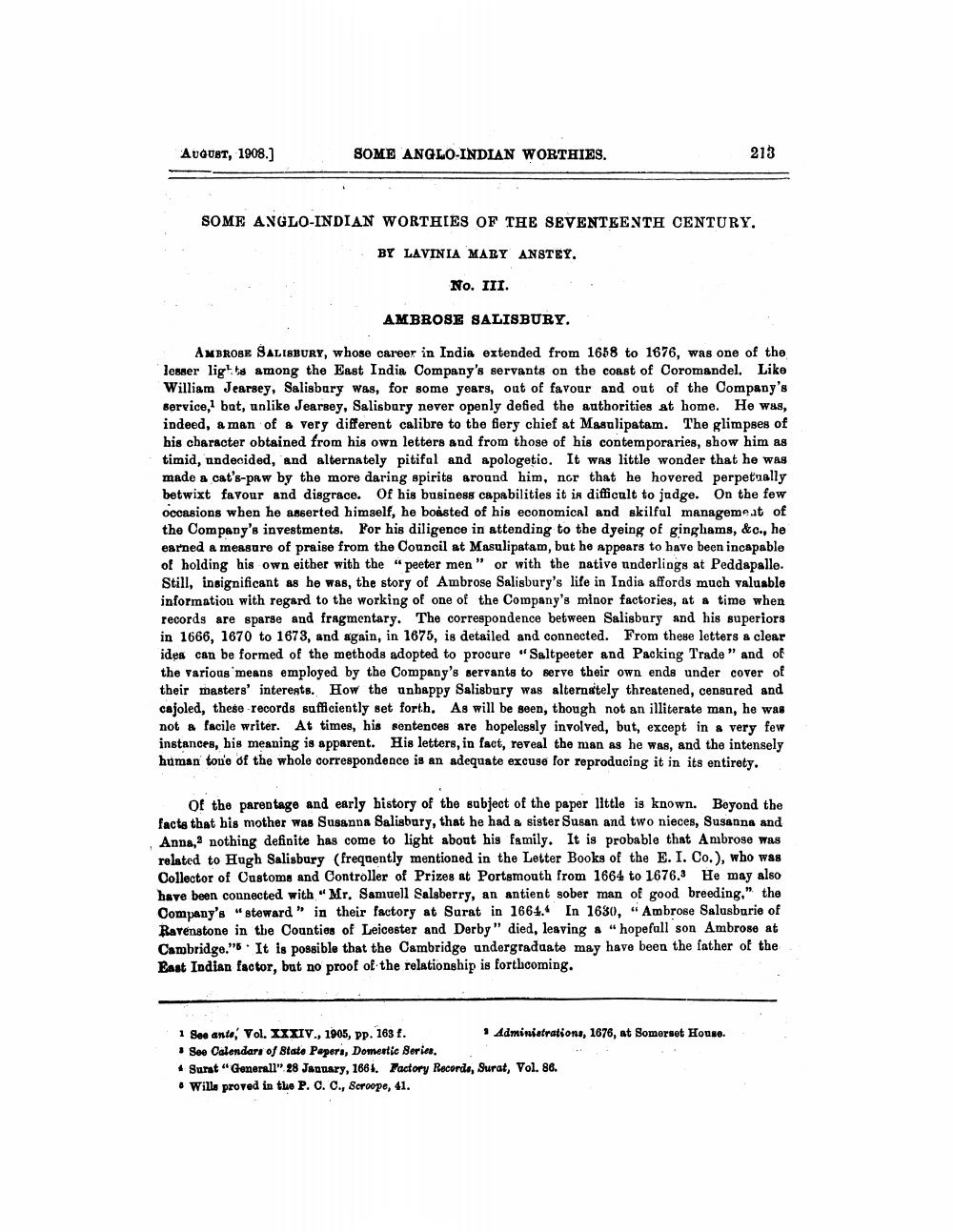________________
AUGUST, 1908.)
SOME ANGLO-INDIAN WORTHIES.
213
SOME ANGLO-INDIAN WORTHIES OF THE SEVENTEENTH CENTURY.
BY LAVINIA MARY ANSTEY.
No. III.
AMBROSE SALISBURY.
AMBROSE SALISBURY, whose career in India extended from 1658 to 1676, was one of the losser lights among the East India Company's servants on the coast of Coromandel. Like William Jearsey, Salisbury was, for some years, out of favour and out of the Company's service, bat, unlike Jearsey, Salisbury never openly defied the authorities at home. He was, indeed, a man of a very different calibre to the fiery chief at Masalipatam. The glimpses of his character obtained from his own letters and from those of his contemporaries, show him as timid, undecided, and alternately pitifal and apologetic. It was little wonder that he was made a cat's-paw by the more daring spirits around him, nor that he hovered perpetually betwixt favour and disgrace. Of his business capabilities it is difficult to judge. On the few occasions when he asserted himself, he bossted of his economical and skilful managemeat of the Company's investments. For his diligence in attending to the dyeing of ginghams, &c., he earned a measure of praise from the Council at Masulipatam, but he appears to have been incapable of holding his own either with the “peeter men" or with the native underlings at Peddapalle. Still, insignificant as he was, the story of Ambrose Salisbury's life in India affords much valuable information with regard to the working of one of the Company's minor factories, at a time when records are sparse and fragmentary. The correspondence between Salisbury and his superiors in 1666, 1670 to 1673, and again, in 1875, is detailed and connected. From these letters a clear idea can be formed of the methods adopted to procure "Saltpeeter and Packing Trade" and of the various means employed by the Company's servants to serve their own ends under cover of their masters' interests. How the unhappy Salisbury was alternately threatened, censured and cajoled, these records sufficiently set forth. As will be seen, though not an illiterate man, he was not a facile writer. At times, his sentences are hopelessly involved, but, except in a very few instances, his meaning is apparent. His letters, in fact, reveal the man as he was, and the intensely human tone of the whole correspondence is an adequate excuse for reproducing it in its entirety.
Of the parentage and early history of the subject of the paper little is known. Beyond the facts that his mother was Susanna Salisbury, that he had a sister Susan and two nieces, Susanna and Anna, nothing definite has come to light about his family. It is probable that Ambrose was related to Hugh Salisbury (frequently mentioned in the Letter Books of the E.I. Co.), who was Collector of Customs and Controller of Prizes at Portsmouth from 1664 to 1676. He may also have been connected with "Mr. Samuell Salsberry, an antient sober man of good breeding," the Company's "steward” in their factory at Surat in 1664. In 1630, "Ambrose Salusbarie of Ravenstone in the Counties of Leicester and Derby" died, leaving a " hopefull son Ambrose at Cambridge." It is possible that the Cambridge undergraduate may have been the father of the East Indian factor, but no proof of the relationship is forthcoming.
1 See anto, Vol. XXXIV., 1905, pp. 163 f.
Administrations, 1676, at Somorset House. Soo Calendars of State Papers, Domestic Serin.
Surat "Generall" 28 January, 1664. Factory Records, Surat, Vol. 86. . Wills proved in the P. C. C., Scroope, 41.




